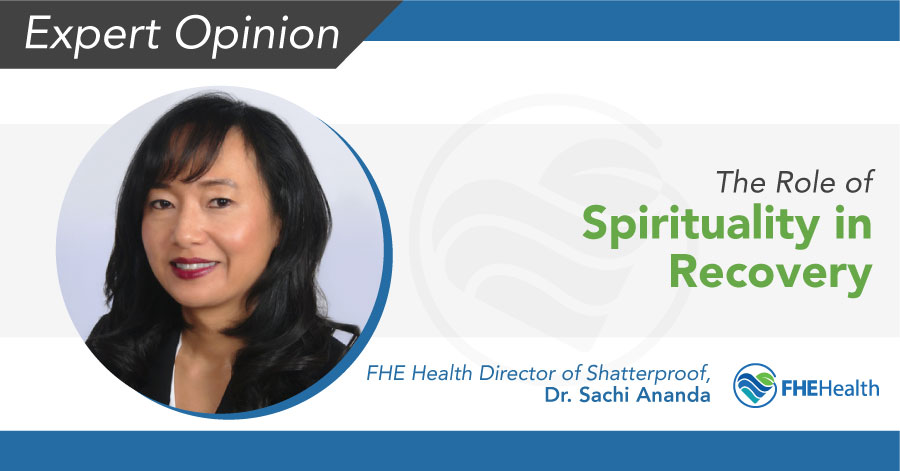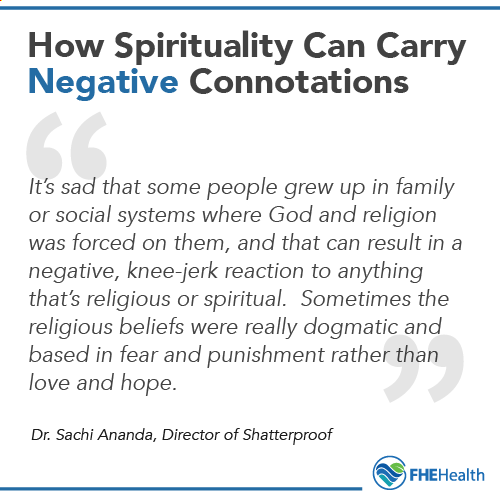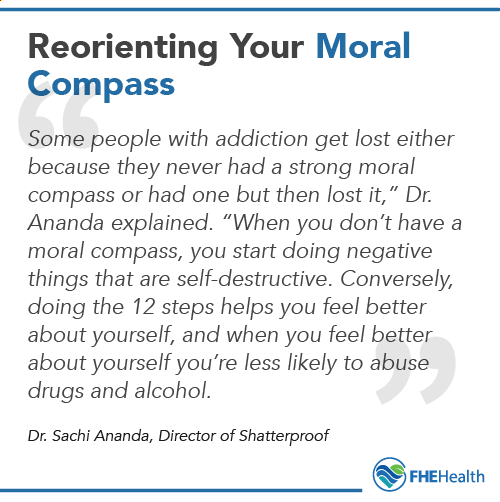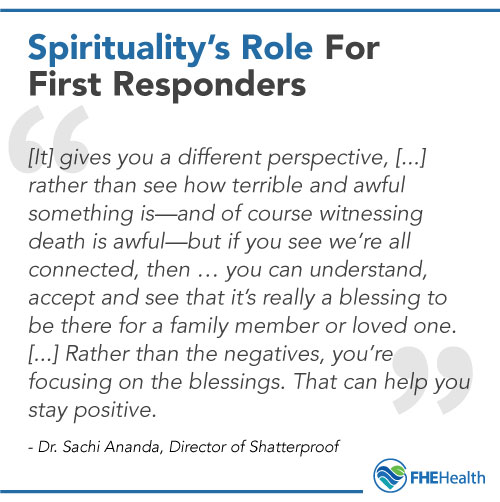
This article has been reviewed for accuracy by our peer review team which includes clinicians and medical professionals. Learn more about our peer review process.
Spirituality can play a positive role in recovery. For a deeper exploration of how—including a discussion of what spirituality is and its application for people with addiction, depression, and other mental disorders—we recently asked Dr. Sachi Ananda to share her insights. As the director of “Shatterproof FHE Health” treatment program for first responders, Dr. Ananda can speak with firsthand expertise about the mental health benefits of spirituality for people in treatment for PTSD, substance abuse, and anxiety and depression (among other conditions). She also is open about her personal interest in spirituality as it relates to health and wellbeing and the research behind it….
What Is Spirituality?
 Our discussion began with the admission that even the word “spirituality” can be a loaded term: It can dredge up different associations for different people (depending on different religious and life experiences, among other individual factors).
Our discussion began with the admission that even the word “spirituality” can be a loaded term: It can dredge up different associations for different people (depending on different religious and life experiences, among other individual factors).
Dr. Ananda addressed this reality head-on: “It’s sad that some people grew up in family or social systems where God and religion was forced on them, and that can result in a negative, knee-jerk reaction to anything that’s religious or spiritual. Sometimes the religious beliefs were really dogmatic and based in fear and punishment rather than love and hope.”
These fear-and-punishment-based systems of belief may qualify as “religion” in a more technical sense, but are not what Dr. Sachi is referencing when she uses the term “spirituality” (and, in particular, spirituality that’s healthy and positive for recovery). A more accurate way to think about spirituality is in terms of connection and developing greater connectedness with oneself, with others, and the world: “The way I like to think of spirituality is that it’s an understanding of how a person is connected to themself, to others, to their environment, and to the greater energy of the universe,” Dr. Ananda said.
How Meditation Aids in Recovery by Fostering Connection
What spiritual practices would Dr. Ananda recommend for helping patients cultivate these deeper connections? Meditation in various forms. Group facilitators and therapists in the Shatterproof FHE Health program “use different meditation techniques, so I leave that very open to them.”
As for the type of meditation that Dr. Ananda prefers when working with patients—and uses personally as well, with the help of a spiritual teacher—“simple breath awareness” is a favorite go-to. That’s because from her experience, first responders often find it hard to sit still and be alone with themselves, because of symptoms of post-traumatic stress and hyper-vigilance. First responders are often accustomed to being “hyper-aware” of the safety of others and themselves, Dr. Ananda explained—so sitting still long enough to connect with oneself can be challenging.
This is where the simplicity of noticing the breath as it comes in and out of the nose can be helpful, especially because it’s easy to do at any time. “You always have to breathe, so patients can always use this technique to reconnect with themselves, calm down, etc..,” according to Dr. Ananda.
How 12-Step Spirituality Boosts Recovery Outcomes
 12-step spirituality, while primarily associated with recovery from drug and alcohol addiction, is another factor that research shows aids in recovery. Dr. Ananda offered some insights into why groups like Alcoholics Anonymous and Narcotics Anonymous and their spiritual principles for recovery are so helpful for so many people.
12-step spirituality, while primarily associated with recovery from drug and alcohol addiction, is another factor that research shows aids in recovery. Dr. Ananda offered some insights into why groups like Alcoholics Anonymous and Narcotics Anonymous and their spiritual principles for recovery are so helpful for so many people.
“There are two different purposes that the 12 Steps can serve,” she said, pointing first to the “fellowship and support” (a.k.a. connection with others and with a “Higher Power”) that these groups offer:
Addiction is a disease of disconnection, and people often turn to drugs and alcohol to fill that emptiness. If people who have an addiction have difficulty connecting with others, then having a spiritual-based program like the 12 Steps can help them connect with others. This fellowship is connecting them to other people who they previously thought they couldn’t talk to.
And, the second primary purpose that the 12 Steps fulfill? They help people “develop a moral compass,” by inculcating “basic values like honesty.”
“Some people with addiction get lost either because they never had a strong moral compass or had one but then lost it,” Dr. Ananda explained. “When you don’t have a moral compass, you start doing negative things that are self-destructive. Conversely, doing the 12 steps helps you feel better about yourself, and when you feel better about yourself you’re less likely to abuse drugs and alcohol.”
The Serenity Prayer – Another Spiritual Tool for Recovery
As further illustration of the role that spirituality can play in recovery—the Serenity Prayer, which Dr. Ananda said she and other FHE clinicians use when ending groups. The famous prayer opens with the well-known petition, “God, grant me the serenity to accept the things I cannot change; courage to change the things I can; and wisdom to know the difference.”
Dr. Ananda has seen firsthand how praying this simple petition has helped patients in Shatterproof FHE Health:
We talk a lot about the need to control and change things and our inability to change situations. This really allows [people in early recovery] to let go of that control over things they’re not able to control. That’s a really strong thread in our program, and I find when someone has issues with God, they’re able to grasp that in order to have any peace in their life, they’ll have to find out what they’re responsible for and what they can control and then let the rest go.
12-Step and Other Spiritual Supports for Managing Mental Illness
What role might spirituality play for people with mental health conditions other than addiction? For starters, while the 12 Steps are usually associated with recovery from drug and alcohol addiction, they can also be helpful for managing mental health conditions like PTSD and depression (among other mental disorders), according to Dr. Ananda.
“We do group work [with people whose primary condition is a mental illness, as opposed to addiction] where we base it on the 12-step system and incorporate the same principles,” she said. “What we like to do is say you can replace the word ‘alcohol’ with any of your self-destructive behaviors … and you’ll find it can also work for you.”
Some other therapeutic benefits of the 12 Steps for mental health more generally:
- “Developing the values of the 12 Steps,” like “working on the personal inventory of yourself and any self-destructive behaviors that have possibly hurt other people”
- Opportunities for self-reflection and accepting responsibility for your actions
- A greater sense of community from attending open AA meetings—although here Dr. Ananda acknowledged that in the long run, these addiction-specific outlets may not be ideal therapeutic outlets for someone managing a mental health condition (as opposed to an addiction)
The Mental Health Benefits of Spirituality for People with Addiction and Mental Illness
 On this point, Dr. Ananda pointed to the research showing that first responders who report having spirituality in their lives “are better able to be resilient in the face of the daily crises they encounter.” These events “would normally affect someone very negatively—this chronic exposure to bad things happening to people—but having a spiritual foundation helps them be more resilient to recover from the chronic exposure to the trauma.”
On this point, Dr. Ananda pointed to the research showing that first responders who report having spirituality in their lives “are better able to be resilient in the face of the daily crises they encounter.” These events “would normally affect someone very negatively—this chronic exposure to bad things happening to people—but having a spiritual foundation helps them be more resilient to recover from the chronic exposure to the trauma.”
In addition, spirituality can “give you a different perspective,” so that “rather than see how terrible and awful something is—and of course witnessing death is awful—but if you see we’re all connected, then … you can understand, accept and see that it’s really a blessing to be there for a family member or loved one.” The takeaway: “Rather than the negatives, you’re focusing on the blessings. That can help you stay positive.” Resilience and staying positive are key to mental health and recovery.
How to Gauge Your Spiritual Health
In many ways, spirituality is synonymous with spiritual health. When asked how she gauges spiritual health, Dr. Ananda answered with a series of questions for self-reflection that anyone can use to go deeper in connecting with self, others and the world. If you’re wondering about your own spiritual health, consider asking yourself the following questions:
- How are you accepting challenges and difficulties in your life?
- Are you able to have gratitude for what you do have?
- Do you have a sense of purpose and meaning in your daily life?
- Do you see negative things as something bad or do you see them as blessings for you to grow and become a better person?
- Are you open and loving towards others and yourself or do you talk very negatively about others and yourself?
“There’s a risk for relapse if you have poor spiritual health, because life is going to have its share of challenges,” Dr. Ananda said. Similarly, she said that if you’re in a really bad space, knowing someone or something greater than you wants you to feel better can help you feel less alone and have hope.
Ultimately, the lesson that spirituality teaches is that if you “hope that you can get better, and if you ask for it, spiritually the help does come.”






